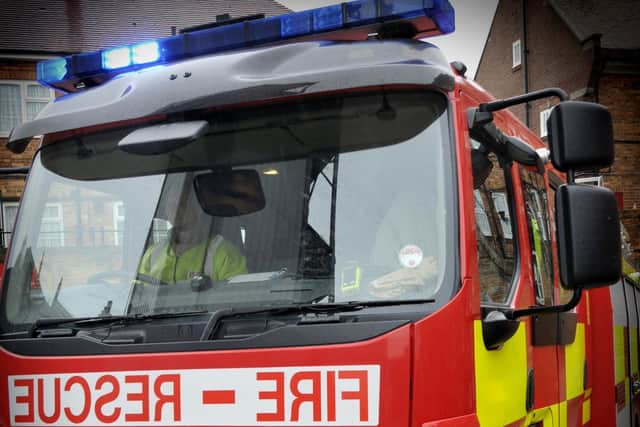West Yorkshire fire crews called to more than 10,000 false alarms in one year
Home Office data shows that More than 40 per cent of all incidents attended by the West Yorkshire Fire and Rescue Service in the year to September 2020 stemmed from false alarms.
Most were caused by faulty equipment or the accidental activation of smoke alarms and sprinkler systems.
Advertisement
Hide AdAdvertisement
Hide AdOf the rest, 28 per cent were raised by people with good intentions, while 286 'malicious' incidents were linked to hoax calls or alarms being set off where there was no fire.


In West Yorkshire, 44 per cent of all calls attended over 12 months were false alarms, while more than 226,000 were logged nationally, including over 5,500 malicious incidents.
A West Yorkshire Fire and Rescue Service spokesperson said: “Whilst the rate of malicious calls is less than one per day, each call still uses valuable time, creates unnecessary blue light journeys and takes a fire engine away from where a genuine emergency may occur.
"Of course we never mobilise to a malicious false alarm, it only turns out to be one when we arrive and find that nothing is happening.
Advertisement
Hide AdAdvertisement
Hide Ad"Our Fire Control staff will always challenge callers who they believe to be making a hoax call, but we must err on the side of caution, and attend the address given, if we remain uncertain.
"Where evidence of a perpetrator is available we will work with our colleagues in West Yorkshire Police to take the matter further.”
Speaking of automatic fire alarms, the spokesperson added: “Within West Yorkshire we have continuously challenged the issue of persistent false alarms.
"In 2011 we introduced a call challenge procedure to calls from Automatic Fire Alarms, this reduced our attendances to false activations by over 40 per cent.
Advertisement
Hide AdAdvertisement
Hide Ad"However, we were still aware that in some cases persistent false alarms were not being addressed by building owners.
"In 2014 we were the first Fire and Rescue Service to introduce cost recovery for persistent false alarms.
"This means that if we attend false alarms at a premises on more than three occasions due to mis-installed or faulty equipment then the building owner will receive an invoice for cost recovery.
"This scheme has further reduced false alarms since its introduction by a further 16 per cent.
Advertisement
Hide AdAdvertisement
Hide Ad"However, due to Covid lockdown measures, with many buildings temporarily closed and unoccupied we suspended the cost recovery process for those premises which were affected by the lockdown. This has resulted in a slight increase in attendances to faulty equipment.”
The National Fire Chiefs Council said false alarms happened “approximately every two minutes” across England and cost services thousands of hours of lost productivity – “time that could be spent on other vital, and often life-saving activities”.
NFCC chair, Roy Wilsher, described the figures as shocking and said malicious callers could prevent crews from attending incidents where people were in serious danger.
He added: “People making these reckless calls need to ask themselves what would happen if a member of their family needed emergency assistance and firefighters were attending a malicious call.
“We need to see this change.”
Advertisement
Hide AdAdvertisement
Hide AdA Home Office spokesperson warned hoaxers that they could face prosecution, adding: "Malicious false alarms take our firefighters away from front line work, protecting our communities and potentially saving lives.
"They can amount to a criminal offence and we support the prosecution of these incidents where appropriate."
Over the course of ten years, the number of false calls has dropped by more than a fifth but in 2020 they still represented more than 40 per cent of all incidents attended by 45 fire services, while actual fires accounted for just 28 per cent.
Almost two-thirds were due to fire alarms or related equipment malfunctioning or being accidentally set off, while almost a third were raised by people who genuinely thought there was an emergency.
Advertisement
Hide AdAdvertisement
Hide Ad'Burnt toast' or general cooking mishaps were behind almost a quarter of all false alarms, with more than 32,000 attributed to faulty smoke alarms and 177, bizarrely, linked to animals.
The Home Office said fire prevention was "core business" for every service and that officers used experience and local intelligence to decide what interventions would best prevent and reduce the risk of fire in their communities.
A number of fire brigades have introduced charging policies in an effort to recover the costs of attending persistent false alarms at hotspots such as hospitals, student halls of residence and airports.
Charges, which differ from service to service, are usually restricted to non-residential facilities and can cost repeat offenders hundreds of pounds for a call-out.